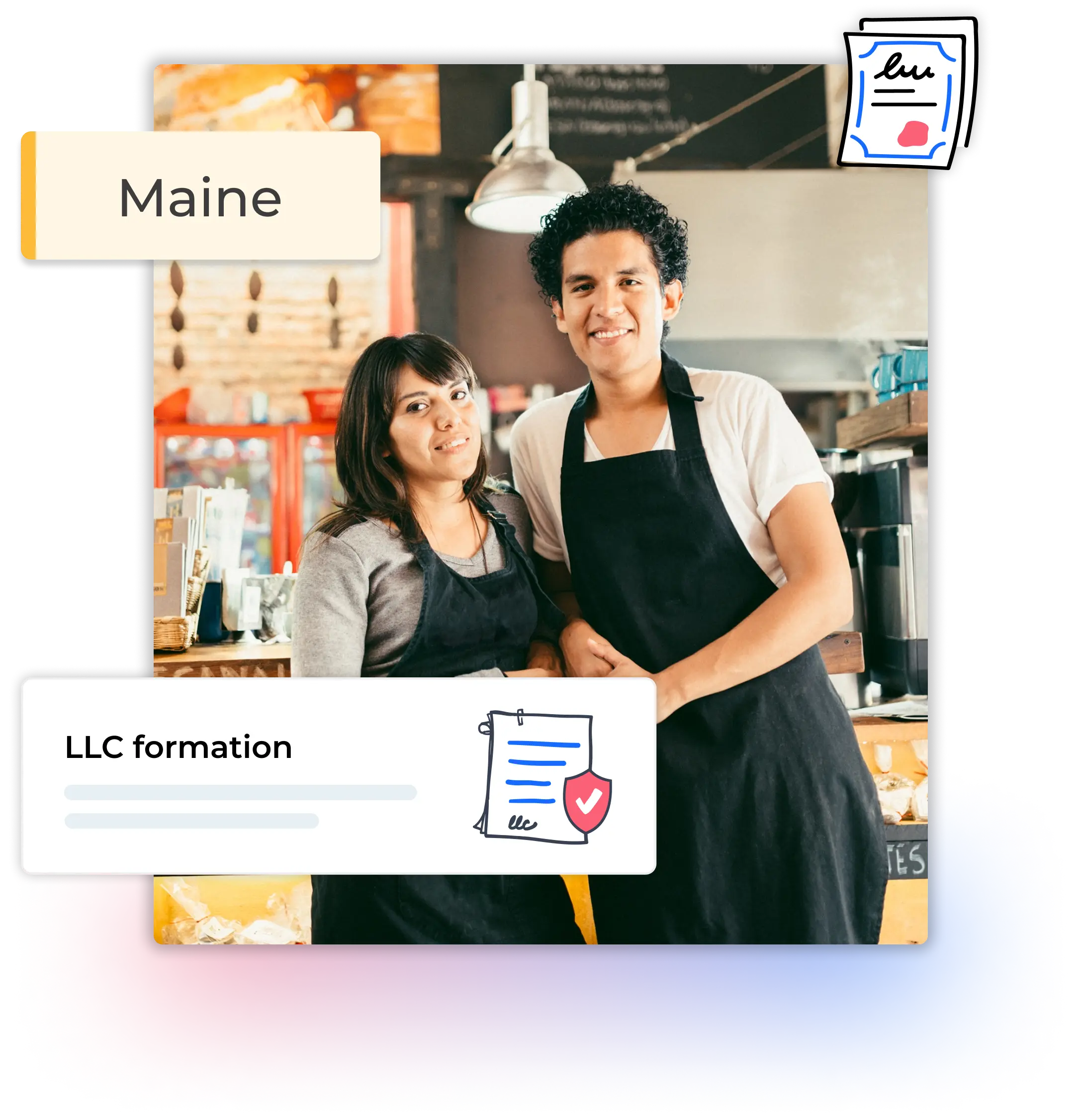Quick facts about forming an Maine LLC
| Filing Fee | $175 (by mail) |
| Processing Time | 5–10 business days (standard), expedited service available |
| Annual/Biennial Report Fee | $85, due by June 1 each year |
| Registered Agent Required | Yes, must have a physical address in Maine |
| State Franchise Tax | None for LLCs |
| Business License | No statewide license, but local permits may be required |
| Managing Authority | Maine Secretary of State, Bureau of Corporations, Elections & Commissions |
How to start an LLC in Maine in 5 steps
Opening an LLC is a smart move for entrepreneurs looking to protect their personal assets and gain legal recognition for their business. An LLC helps you operate legally, with flexibility and liability protection.
The process in Maine includes several important steps, but it’s easy to navigate, especially with Tailor Brands guiding you through everything from filing to compliance.
- Name your Maine LLC
- Choose a registered agent
- File certificate of formation
- Create an operating agreement
- Apply for an employer identification number, or EIN
Step 1: Name your Maine LLC
The name of your LLC must be distinguishable from other registered entities in Maine and must include “Limited Liability Company” or an accepted abbreviation like “LLC” or “L.L.C.”. It also can’t imply that your business provides services it isn’t authorized to perform (like using “bank” or “attorney” without proper licensing).
You can do a Maine corporation search on the Secretary of State’s Corporate Name Search tool. Unlike many other states, Maine does not currently offer online name reservation, but you can claim your name by submitting it with your Certificate of Formation.
Step 2: Choose a registered agent
You need to appoint a Maine registered agent that is located in the state. This can be a person or a business entity authorized to receive legal and official documents on your behalf. The agent must have a physical Maine address (P.O. boxes aren’t allowed).
If you’re not based in Maine or prefer to keep your personal address private, you can appoint a commercial registered agent, Tailor Brands includes this option during setup.
Step 3: File the certificate of formation
To officially create your LLC, you’ll need to file a Certificate of Formation with the Secretary of State. Unlike many states, Maine only accepts this form by mail or in person, there is currently no online filing option.
The certificate includes your LLC’s name, the name and address of your registered agent, and whether your business will be managed by members or managers.
- Filing fee: $175
- Processing time: 5–10 business days (expedited options available for an additional fee)
Step 4: Create an operating agreement
The state requires LLCs to have a Maine LLC operating agreement. It is an essential document, especially if it has more than one member. It outlines how your business will be managed, how decisions are made, and what happens if someone leaves the company.
Tailor Brands provides a customizable Operating Agreement template, making this step easier to complete right after filing.
Step 5: Apply for an EIN
An Employer Identification Number (EIN) is your LLC’s federal tax ID. You’ll need it to open a business bank account, file taxes, or hire employees. You can apply for one online through the IRS for free, or let us get it for you.
Costs and Compliance Requirements for LLCs in Maine
Here’s an overview of the common costs and ongoing filing obligations for a Maine LLC (see a detailed review of the Maine LLC cost):
| Form/Service | Cost | Frequency |
| Certificate of Formation | $175 | One-time |
| Registered Agent (if using a service) | Varies ($100–$150/year) | Annual (if applicable) |
| Annual Report | $85 | Annual (due June 1) |
| EIN (if using a paid service) | Optional | One-time |
| Local Licenses/Permits | Varies by town/industry | Varies |
The annual report requirement: Every Maine LLC is required to file an Annual Report with the Secretary of State. The Maine annual report filing keeps your company’s contact and ownership information current with the state and is due by June 1 each year. The filing fee is $85.
You can file online, by mail, or in person. Failure to file by the deadline may result in late fees or administrative dissolution of your LLC.
FAQ
It costs $175 to file a Certificate of Formation with the Maine Secretary of State by mail.
No, Maine only accepts filing of articles of organization through the mail.
Processing usually takes 5–10 business days, but expedited service is available for an additional fee.
Yes, every Maine LLC must have a registered agent with a physical address in the state to receive legal and official documents.
No, Maine does not require an operating agreement, but having one is recommended to outline ownership and management details.
Yes, all Maine LLCs must file an annual report by June 1 each year and pay an $85 filing fee to stay in good standing.
No, Maine does not charge a franchise tax for LLCs, though members may owe state income tax on earnings.
Yes, nonresidents can form an LLC in Maine as long as they appoint a registered agent with a Maine street address.
Maine does not have a statewide business license, but certain cities or professions may require local permits or state-level certifications.




